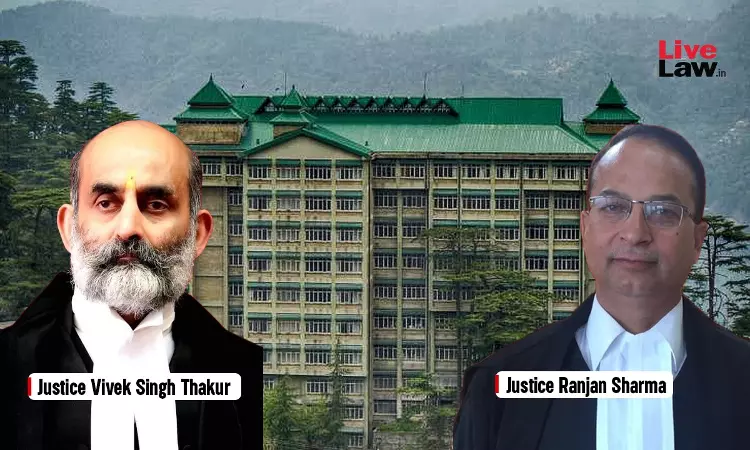- Home
- /
- High Courts
- /
- Himachal Pradesh High Court
- /
- Medical Reimbursement Can't Be...
Medical Reimbursement Can't Be Denied On Flimsy Grounds When Claim Is Admissible Under State Policy: Himachal Pradesh High Court
LIVELAW NEWS NETWORK
22 Jun 2025 4:00 PM IST
The Himachal Pradesh High Court has held that a medical reimbursement claim cannot be denied on flimsy or irrelevant grounds when it was admissible under the beneficial policy of the State Government. A Division bench of Justice Vivek Singh Thakur & Justice Ranjan Sharma held as follows; “Once a medical claim is admissible in terms of beneficial policy of the State, the same...
The Himachal Pradesh High Court has held that a medical reimbursement claim cannot be denied on flimsy or irrelevant grounds when it was admissible under the beneficial policy of the State Government.
A Division bench of Justice Vivek Singh Thakur & Justice Ranjan Sharma held as follows;
“Once a medical claim is admissible in terms of beneficial policy of the State, the same should not be denied on flimsy grounds or irrelevant factors”.
Background Facts:
The petitioner, Ishwar Dass, is a retired government school teacher. In September 2016, his wife had undergone knee replacement surgery in Postgraduate Institute of Medical Education and Research, Chandigarh. Subsequently, he submitted all the required documents for reimbursement of the surgery cost to Block Elementary Education Officer, District Kangra, Himachal Pradesh, who sent the medical bills to Deputy Director, Elementary Education Kangra.
However, the medical bills were sent back by the Deputy Director, raising certain objections. Thereafter, the Block Elementary Education Officer, restricted the claim to Rs.2,08,495/- and re-submitted them. The Deputy Director again raised objections, and the claim was reduced to Rs.1,43,495/-. Eventually, the claim was rejected on the ground that it was time-barred. Despite further submissions and compliance with formalities, no progress was made for two years.
Aggrieved, the petitioner approached the H.P. State Administrative Tribunal. During the pendency of the case, only ₹2,08,495 was reimbursed against the actual claim of ₹2,93,295, leaving ₹84,800 unpaid. Later, when the tribunal was abolished the matter was transferred to the High Court as petition No. CWPOA No.6723/2020.
Contentions:
The petitioner contended that his wife was treated at Postgraduate Institute of Medical Education and Research, Chandigarh, a Government Institution and the medical claim of Rs.2,93,295/-, had been duly verified and signed by the concerned Doctors. Therefore, the respondents had no authority to deduct Rs.84,800/- from the admissible claim.
In response, the State contended that the deduction was based on a ceiling limit fixed under an Office memorandum issued by the Government of India in 1995. The said memorandum prescribed maximum rates for reimbursement under the Central Government Health Scheme and the Central Services (Medical Attendance) Rules.
Findings:
The Court observed that it was clear from the record that the petitioner's wife had undergone knee replacement surgery at Postgraduate Institute of Medical Education and Research, Chandigarh. It noted that the State had relied solely on the 1995 office memorandum, which fixed ceilings for reimbursement of knee and hip implants. However, that memorandum itself clearly stated that it was valid for only five years i.e., until March 30, 2000.
The Court also noted that the office memorandum of 1995 was later updated in 2017, which revised the ceiling rates for knee and hip replacement implants as per the Central Government Health Scheme and the Central Services (Medical Attendance) Rules. However, the revised memorandum was applicable from 26.09.2017 and did not have a retrospective effect. So, when the petitioner's wife underwent surgery in 2016, neither the 1995 nor the 2017 memorandum was applicable.
Further, the Court held that the office memorandums or circulars issued by the Central Government do not automatically apply to State employees unless formally adopted by the State Government. However, in this case, no such adoption was made by the State Government.
Thus, the Court concluded that there was no valid ceiling in force at the relevant time and that the petitioner's claim could not be lawfully restricted. It held that once a medical claim is admissible under the applicable State policy, it should not be denied on flimsy grounds or irrelevant considerations. Therefore, the Court directed the state to reimburse the balance amount of ₹84,800 to the petitioner.
Case Name: Ishwar Dass v/s State of HP & ors
Case No.: CWPOA No.6723 of 2020
Date of Decision: 18.06.2025
For the Petitioner : Ms. Sangeeta Vasudeva, Advocate.
For the Respondents-State : Ms. Seema Sharma, Deputy Advocate General.



